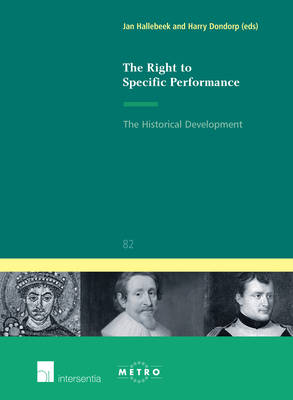
- Afhalen na 1 uur in een winkel met voorraad
- Gratis thuislevering in België vanaf € 30
- Ruim aanbod met 7 miljoen producten
- Afhalen na 1 uur in een winkel met voorraad
- Gratis thuislevering in België vanaf € 30
- Ruim aanbod met 7 miljoen producten
Omschrijving
By presenting historical materials, this volume elucidates the quandary of the law of obligations when it has to answer the question what a creditor eventually will acquire: damages or specific performance? In this respect it appears two principles continually compete for priority: 'all obligations should be fulfilled in specie' and 'no-one should be compelled to act'. What settles the dilemma? Is it fidelity to the given word or human freedom? Seven contributions discuss features of this problem for various periods of time and jurisdictions: Roman law, Medieval learned law, early-modern Spanish doctrine, Roman-Dutch law, 19th century German law, developments in the Netherlands during the 19th and 20th centuries and contemporary Dutch law.
This book is a sequel to volume 71 of the same series (Specific Performance in Contract Law: National and Other Perspectives). It resulted from the co-operation between legal historians, participating in the programme 'Contract law and law of obligations in general' of the research school Ius Commune.About this book:
'[This book] works well as an edited collection and manages to convey the complexity of this legal institution with great effect. It also demonstrated how important an understanding of the history of legal doctrine is for the advancement of European legal history as an academic discipline.'
Paul J du Plessis in The Edinburgh Law Review 15 (2011) 145.
Specificaties
Betrokkenen
- Auteur(s):
- Uitgeverij:
Inhoud
- Aantal bladzijden:
- 189
- Taal:
- Engels
- Reeks:
Eigenschappen
- Productcode (EAN):
- 9789400000339
- Verschijningsdatum:
- 11/02/2010
- Uitvoering:
- Paperback
- Formaat:
- Trade paperback (VS)
- Afmetingen:
- 152 mm x 229 mm
- Gewicht:
- 399 g

Alleen bij Standaard Boekhandel
Beoordelingen
We publiceren alleen reviews die voldoen aan de voorwaarden voor reviews. Bekijk onze voorwaarden voor reviews.











